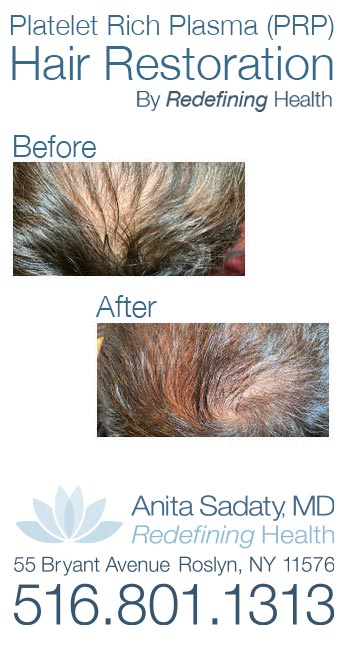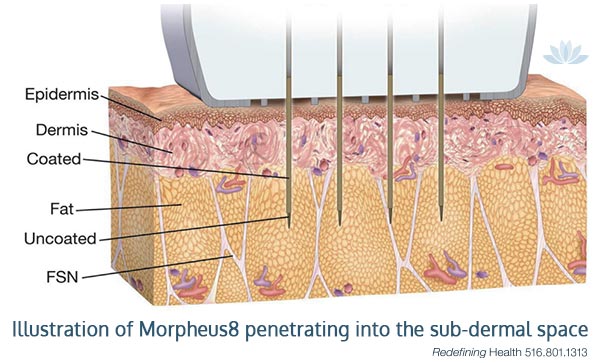New York Hair Regrowth & Hair Restoration
Redefining Health Medical offers several different types of hair regrowth and hair restoration treatments
Hair Regrowth & Hair Restoration
Discover a new approach to hair rejuvenation for women (and men) at Redefining Health Medical in Roslyn, New York. Our dedicated team is passionate about providing innovative, non-surgical treatments that can make a real difference in your appearance. Whether you’re seeking to boost the thickness of your hair or put a stop to hair loss, we offer a diverse range of cutting-edge solutions you won’t find anywhere else. From platelet-rich plasma therapy to low-level laser therapy to the brand new Alma Ted, we have the non-invasive treatments you need to redefine your hair’s health.
Hair loss can be the cause of significant anxiety and loss of self esteem in both men and women. There are many reasons that men and women experience enough hair loss. Therefore, it is important to look for the different causes of hair loss that can be reversed, if identified early and treated.
We offer consultations and provide before & after pictures of our patients so you can gain a deep understanding of the latest hair restoration and regrowth treatments available from our practice. Call us to learn more! 516.801.1313.


Platelet Rich Plasma – PRP For Hair
PRP hair therapy has become the leading and most effective treatment for male and female pattern hair loss — also known as androgenetic alopecia — the most common cause of hair loss.
What is PRP?
Platelet rich plasma is a nonsurgical treatment which uses your own blood supply to provide your hair with essential growth factors and nutrient enrichment to rescue injured hair follicles.
How is it done?
A blood draw is done in the office and spun down to separate out the red blood cells from the remaining plasma. The plasma containing all of the beneficial nutrients and growth factors is directly injected into the scalp to target the hair follicles.
What are the benefits of Platelet Rich Plasma Hair Therapy?
The platelets contain growth factors that promote healing and tissue regeneration. PRP has been shown to increase the number of hairs, improve hair thickness and extend the growth phase of the hair.

How many treatments are needed to see an effect?
A typical treatment will consist of 3-6 sessions spaced 4-6 weeks apart. The number of required sessions depends on the extent of hair loss and the response of your hair to each treatment.
Maintenance therapy is typically required every 3-6 months to maintain hair growth and to continue to nourish and support the hair follicles from ongoing loss or damage.
Is PRP Hair Therapy safe?
Since the plasma is derived from your own blood, it is very safe.
What are the side effects?
Scalp soreness and headache are the most common side effects. We ask that you do not wash your hair until 24 hours after the procedure.
Who is a candidate?
A good candidate will show signs of early hair loss. Extreme long standing balding or evidence of scalp scarring or permanent destruction of hair follicles will not benefit from this treatment.
Polydioxanone (PDO) Threads for Hair Regrowth
During the PRP treatment, we add two other treatments to maximize hair growth and hair restoration. We use microneedling to increase blood flow to the hair follicles. You can go to our microneedling page for a comprehensive overview, but in a nutshell, microneedling is a micro puncture to the scalp. During this process, we apply a PEPFactor serum as well. It contains copper peptides and key nutrients for hair nourishment.
After the microneedling, smooth PDO threads are inserted into the scalp. The threads provide additional collagen, which is necessary for hair growth. The threads cannot be felt or seen and they break down over a period of 4-6 months, providing a nice boost to our hair restoration process.
- Fine lines and wrinkles
- Skin discoloration (brown spots and hyperpigmentation) on the face and body
- Areas of sun damage, freckles
- Spider veins and broken blood vessels
- Used to treat redness associated with rosacea

Microneedling For Hair Loss
Microneedling for hair loss is often combined with PRP treatment for additional benefit. This entails a device that creates some microinjury to the scalp. Microneedling stimulates collagen and blood flow to the hair follicle.

What Is PepFactor?
PepFactor is an advanced cosmetic skin system that was developed by doctors and scientists. This research team are the co-inventors of Authentic Bio Identical Basic Fibroblast Growth Factor (bFGF), the world’s first uniquely formulated protein for skin rejuvenation and offers exciting regenerative properties. The PepFactor Skin serum also contains hydrating hyaluronic acid, which aids in creating an environment for hair regrowth.
Contact Redefining Health Medical Today To Learn More!
Have questions on whether our hair regrowth and hair restoration treatments are right for you? Contact us today to learn more about these ground-breaking solutions!

Blood work can often reveal underlying causes that impact healthy hair growth. Examples include:
- Excessive androgens
- Deficient estrogen and progesterone
- Thyroid hormone imbalance
- Stress hormone abnormalities
- Nutrient deficiencies such as B vitamins, iron, amino acids, and antioxidants
- Increased inflammation
- Autoimmune factors
- Intestinal Microbiome imbalances
Rebrote y restauración del cabello
La caída del cabello puede ser la causa de una ansiedad significativa y pérdida de autoestima tanto en hombres como en mujeres que viven en Nueva York. Hay muchas razones por las que hombres y mujeres experimentan suficiente pérdida de cabello que puede cambiar drásticamente su apariencia. Por lo tanto, es importante buscar las diferentes causas de la caída del cabello que pueden revertirse si se identifican y tratan a tiempo.
Los análisis de sangre a menudo pueden revelar causas subyacentes que afectan el crecimiento saludable del cabello. Los ejemplos incluyen:
- Andrógenos excesivos
- Estrógeno y progesterona deficientes
- Desequilibrio de la hormona tiroidea
- Anomalías de la hormona del estrés
- Deficiencias de nutrientes como vitaminas B, hierro, aminoácidos y antioxidantes
- Aumento de la inflamación
- Factores autoinmunes
- Desequilibrios del microbioma intestinal
